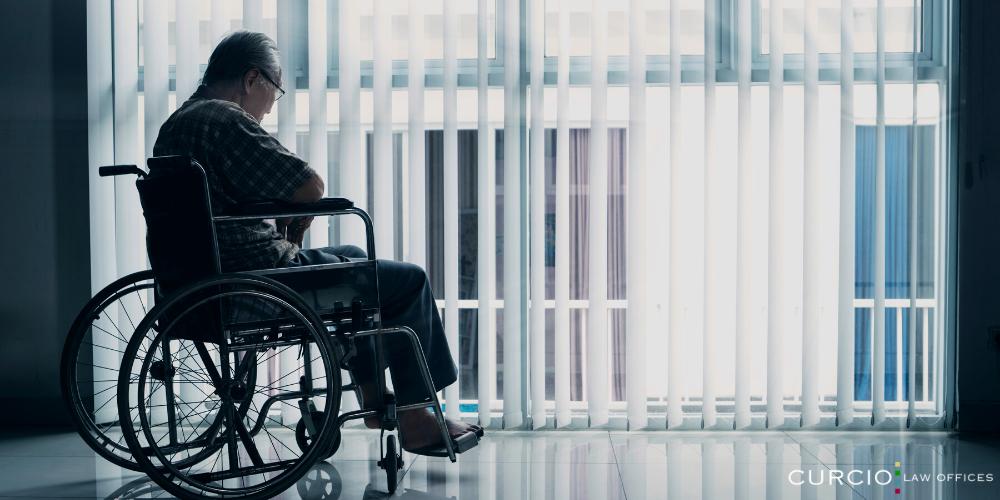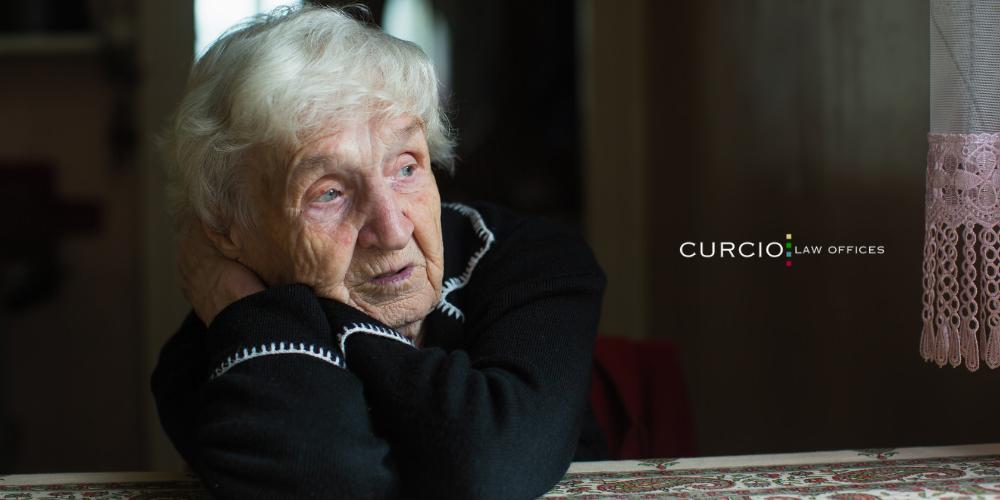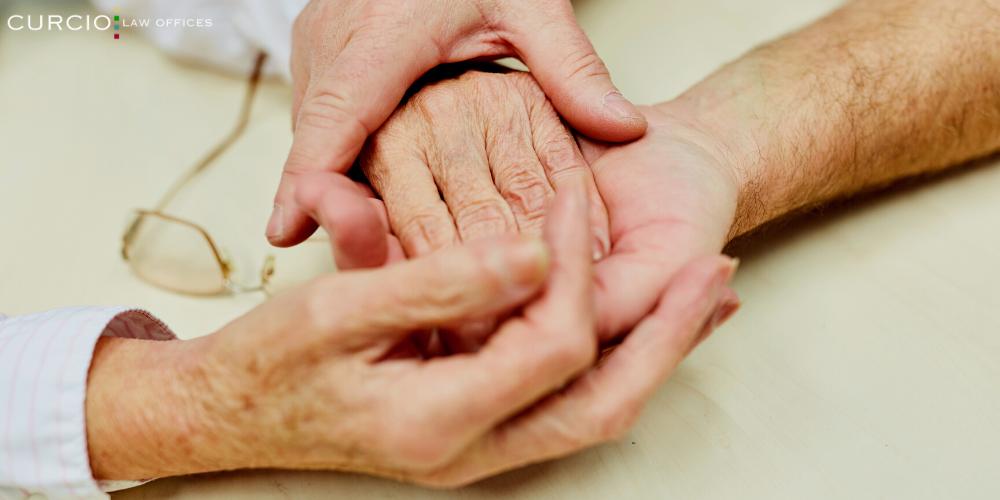Mental Health in Nursing Homes Chicago
PRACTICE AREAS
Chicago Lawyer for Mental Health in Nursing Homes
Medicaid-certified nursing facilities are required by law to do what they can to promote physical, mental, and social well-being among nursing home residents. Many nursing homes (though certainly not all) only have the time, money, and resources to promote physical health. But promoting mental health in nursing homes is just as important as promoting physical health, if not more so. Physical health and mental health directly influence each other. If mental health care suffers, the physical health does, too.
Mental health disorders among nursing home residents can be caused by a variety of things, such as general old age, grief, isolation, lack of appropriate treatment, and even nursing home abuse and neglect.
Many nursing home residents with serious mental illness diagnoses have an incredibly high risk of malnutrition, dehydration, bedsores, chronic pain, mobility problems, and even early death. Despite the countless risks, geriatric psychiatry services in Chicago nursing homes are put on the back burner, mostly due to Chicago nursing home understaffing and poor training.
Poor mental health in nursing homes may be a partial explanation as to why 53% of residents die within six months of checking into their facility, and our Chicago nursing home wrongful death lawyers can attest.
If your elderly loved one is suffering from mental health problems due to nursing home abuse and neglect, you may have grounds to take legal action. Or, if your elderly loved one has a serious mental illness and they’re not receiving the mental health care they desperately need, you could also pursue legal action. The Chicago nursing home abuse lawyer team at Curcio Law Group has decades of combined experience in pursuing justice and financial compensation for older adults and their families that have seen a lack of care for mental health in nursing homes.
Call our Chicago elderly abuse attorneys today at 312-321-1111 to schedule a free consultation.

How Many Nursing Home Residents Have Mental Disorders in Illinois?
Many people think of nursing facilities as places where older adults go when their physical health starts to decline. While this is true, it’s important for people to realize that a large percentage of nursing home residents also suffer with major mental health problems. In fact, a 2010 national survey and study from the American Geriatrics Society claims that between 65% and 91% of nursing home residents suffer from some kind of mental disorder.
Why Mental Illness in Chicago Nursing Homes is High
Dementia and Alzheimer’s disease have always been some of the most common mental health disorders to afflict nursing home residents. But over the last few decades, more and more nursing home residents have exhibited symptoms of other psychotic disorders. Now, many nursing facilities report that a larger percentage of nursing home residents with mental health conditions (such as anxiety disorders, bipolar disorder, and major depression) outweigh the percentage of residents with neurocognitive disorders like dementia.
This is because many mental health facilities closed and downsized in the 1960s and 1970s. A large percentage of the people who were receiving these round-the-clock psychiatric services were older adults. So these patients receiving mental health services were all transferred into nursing homes. In fact, the number of older adults receiving round the clock psychiatric services decreased by 40% while nursing home residents with mental health problems increased by more than 100% during this time.
The same study by the American Geriatrics Society claims that of the 996,311 older adults admitted to U.S. nursing homes in 2005, 19% were afflicted with serious mental illnesses other than dementia, while only 12% were afflicted with dementia.
Common Types of Mental Health Conditions in Nursing Homes
Common types of psychiatric disorders and mental health conditions, other than dementia and Alzheimer’s Disease, among nursing home residents include:
Anxiety disorders such as Generalized Anxiety Disorder (GAD), phobias, social anxiety disorder, panic disorder, etc.
Post traumatic stress disorder (PTSD)
Bipolar disorder
Major depression and/or depressive symptoms
Schizoaffective disorders such as schizophrenia and other psychotic disorders
Mental retardation
Among nursing home residents with mental health conditions, depression and depressive symptoms are the most common.
Medical care research studies estimate that between 6% to 26% of nursing home residents suffer from major depression while 11% to 50% of residents suffer from depressive symptoms.

Common Causes of Mental Illness in Chicago Nursing Homes
Nursing home residents with mental illness can suffer chronically for a variety of reasons, including:
Moving from their home to a nursing home or moving from one nursing facility to another
Having a chronic physical illness
Having chronic pain
Grieving the loss of family members and/or friends
Having a history of trauma
Lack of independence
Less control over lifestyle and daily routine
Isolation from other nursing home residents
Lack of visits from family members and/or friends
Complications of immobility in the nursing home due to health conditions/pain
Malnutrition
Medication errors
Financial difficulties due to nursing home expenses
Nursing home abuse and neglect
Our Chicago medical malpractice law firm has seasoned attorneys who can help determine whether the mental health care led to or furthered the mental illness for nursing home residents. We have Chicago nursing home malnutrition lawyers and Chicago nursing home medication errors lawyers on staff that can help distinguish if the root cause of a serious mental illness was exacerbated by the lack of care for mental health in nursing homes.
How Poor Mental Health in Nursing Homes Can Impact Overall Health
Physical health can dramatically impact mental health, and vice versa. Once older adults begin to physically or mentally decline, their entire well being tends to suffer.
Poor mental health in nursing homes can worsen pre-existing conditions such as heart conditions and gastrointestinal issues. Chronic stress from an unmanaged chronic mental illness, such as anxiety disorders, a bipolar disorder, depression or depressive symptoms, or any other mental disorder creates stress on every major bodily system for Chicago nursing home residents, particularly the immune system.
Older adults already struggle with weakened immune systems due to old age and pre-existing health conditions. The extra strain from lack of mental health services can lead to an increase of infections, antibiotic resistance, sepsis, and even death.
Additionally, Chicago nursing home residents who experience depressive symptoms, psychiatric disorders, or mental disorders will struggle to complete basic self-care activities, like getting out of bed, eating, brushing their teeth, taking their medication, etc. Lack of self-care can lead to a whole host of health problems, like bed sores from lack of mobility, increased infections from malnutrition, dental decay due to poor oral hygiene, and the list goes on.
That is why it’s so crucial to prioritize older adult mental health in all skilled nursing facilities. Unfortunately, many U.S. nursing homes don’t have the time, money, or resources to provide mental health services to their residents. Providing behavioral health services or managing mental health in nursing homes doesn’t seem to be a high priority among Chicago nursing home staff members.
At Curcio Law Group, our Chicago nursing home infection lawyer team has Chicago nursing home sepsis attorneys, Chicago nursing home bed sores attorneys, and Chicago MRSA lawyers that can help families determine whether their loved one’s mental health problems or mental illnesses stemmed from a lack of mental health care for nursing home residents or some other reason.
Is Poor Mental Health in Nursing Homes a Sign of Nursing Home Abuse?
Yes, poor mental health in nursing homes is certainly a sign of nursing home abuse or neglect. As previously stated, the quality of care that older adults receive in their nursing homes dramatically impacts both physical and mental health. A nursing home resident with pre-existing mental health conditions can quickly deteriorate even further if they’re experiencing nursing home abuse and neglect in the nursing facility. Similarly, nursing home residents with no prior history of serious mental illness can suddenly develop behavioral symptoms or a mental health condition when they’re being abused or aren’t receiving the quality of care needed in their nursing home.
Managing mental health is a key component of quality of care for health care professionals. This includes certified nursing assistants and health care workers providing services in nursing homes.

Lack of Mental Health Services Can Be a Form of Nursing Home Abuse and Neglect
Nursing home abuse can involve verbal abuse, emotional abuse, physical abuse, sexual abuse, and even financial abuse among nursing home residents. Meanwhile, neglect often entails a lack of basic needs, like lack of food, lack of medications, lack of good personal hygiene, lack of necessary medical care, etc. It’s also important to remember that a lack of mental health services for nursing home residents is also considered nursing home abuse and neglect.
Chicago nursing homes that provide medicaid services are required to uphold a standard of care for both physical health and mental health services.
Ever since the 60s and 70s, when many facilities for those with psychiatric disorders shut down, nursing homes have struggled to provide mental health services for their residents with serious mental illnesses due to understaffing and lack of training. This led to frequent use of both physical and chemical restraints in order to subdue nursing home residents with serious mental illness, instead of providing behavioral health services in nursing homes.
The quality of care in some of Chicago’s nursing homes is infuriating. In the Nursing Home Reform Act of 1987 provides all nursing home residents the ability to be free from chemical restraints for the sole purpose of disciple or convenience of nursing home employees. Please know that our Chicago unreasonable restraint lawyers take this form of nursing home abuse seriously, regardless if older adults have mental health problems or not. Everyone, especially older adults need to be treated with respect.
In fact, a national nursing home survey suggests that up to 80% of nursing home residents with mental illness did not receive an appropriate psychiatric consultation, primary diagnosis based on medical evidence or even standard behavioral health care from a mental health professional. Given what we know now about the intimate connection between physical health, mental health, and mortality, a failure to provide mental health services is dangerous and unacceptable.
The current standards for quality of care for mental health in nursing homes needs improvement, but for the time being, our Chicago nursing home abuse attorneys will fight for our Chicago nursing home residents with behavioral health or mental health problems.
Can You Sue for Poor Mental Health in Nursing Homes?
Yes, you can sue nursing home staff members or the entire nursing home if your elderly loved one is suffering from mental illness as a result of nursing home abuse and neglect. You can also sue if your elderly loved one has a known, serious mental illness and they’re not receiving the mental health care that they desperately need. Several articles for medical care research, including medical expenditure survey, national nursing home survey, medicare current beneficiary survey, and countless studies from the World Health Organization, show that poor mental health in nursing homes can lead to a variety of physical health issues, and even early death for older adults, if not treated properly.
Nursing home residents with a serious mental illness and their family members deserve justice and financial compensation for any kind of nursing home abuse and neglect. Chicago’s top notch elder abuse lawyers at Curcio & Casciato prioritize mental health in nursing homes. We can analyze the details of the nursing home situation and help you determine if you have a strong case against the nursing home for lack of mental health treatment, especially if the nursing home is providing medicaid services.
Compensation for Lack of Care for Mental Health in Nursing Homes
A Chicago nursing home abuse lawyer can help you and your elderly loved one recover financial compensation for the following types of damages:
Medical bills
Rehabilitative bills
Emotional distress
Physical pain and suffering
Expenses associated with switching nursing homes
Funeral and burial expenses if the nursing home abuse and neglect resulted in wrongful death
Managing Mental Health in Nursing Homes
Managing mental health in nursing homes is a critical part of having overall healthy and happy nursing home residents. Tragically, geriatric psychiatry services and enrichment activities are often put on the back burner in nursing homes, especially since the COVID-19 pandemic wiped out thousands of nursing home staff members, even though business owners that provided Medicaid services in nursing homes received billions of dollars from the federal government to ensure those same health and human services remained.
If your loved one’s current nursing home doesn’t complete the following steps to manage mental health disorders (and your loved one’s health is suffering as a result), please speak to our legal team:
Providing basic mental health care/psychiatric services with a geriatric psychiatry or mental health professional and/or psychiatric medications.
Encouraging family members to visit their loved ones regularly.
Scheduling group activities and games with other nursing home residents.
Encouraging and/or scheduling daily physical activity (walking outside, going to the facility gym, etc.)
Encouraging mentally stimulating activities like doing puzzles, playing memory games, coloring in adult coloring books, doing word searches/crosswords, etc.
Making sure that residents eat meals together.
Making sure nursing home residents eat 3 healthy meals a day.

Nursing Home Abuse Lawyers for Lack of Mental Health in Chicago Nursing Homes
If a close nursing home resident is suffering from a serious mental illness, demonstrating serious behavioral health issues, or mental health problems due to nursing home abuse and neglect in Chicago, you have grounds to contact Curcio & Casciato. Our Chicago nursing home abuse lawyers can listen to your loved one’s situation and help you determine the best course of action, whether that be reporting the nursing home, choosing a different nursing home, filing a Chicago elder abuse lawsuit, or all of the above.
We want to ensure that nursing home residents in the Chicagoland area receive the best physical and mental health care possible. Call 312-321-1111 to schedule a free consultation with our legal team.


